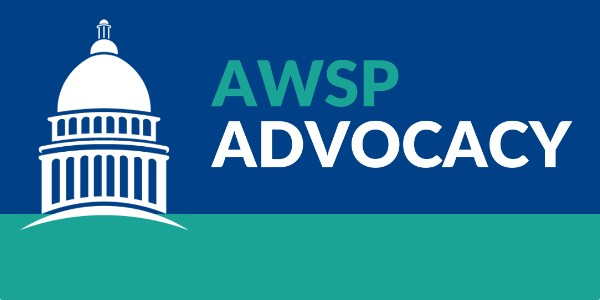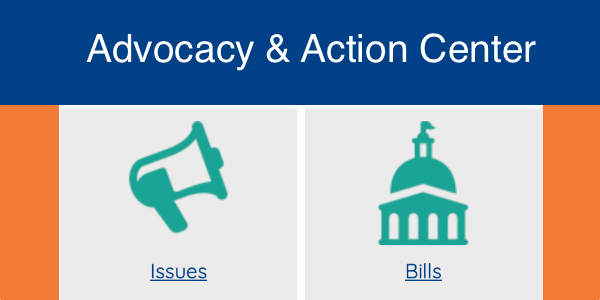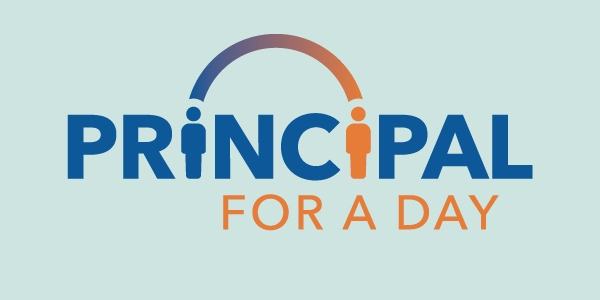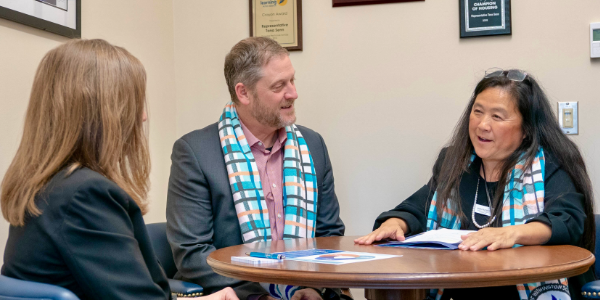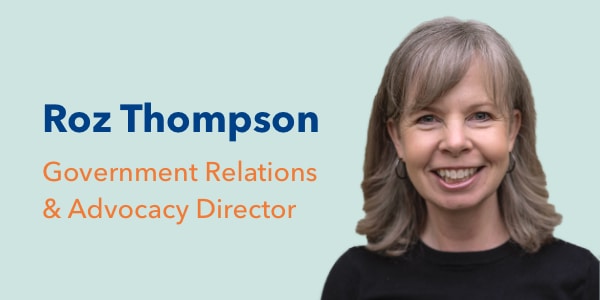This week was all about floor action in both the House and the Senate. Listening to the discussion among legislators as they discuss bills and potential amendments - even on Zoom - can be very insightful. Legislators are working hard to get bills passed by their next deadline of March 9th when they have to be passed out of each house to stay alive.
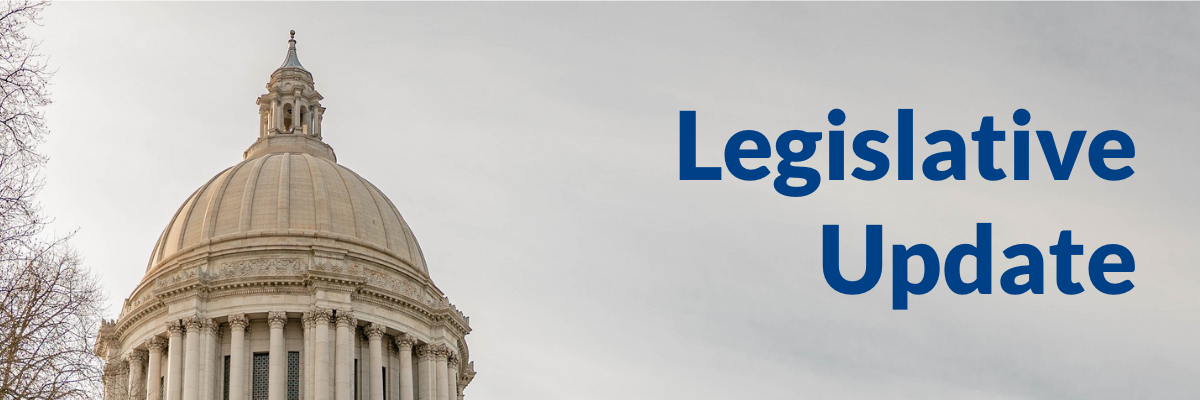
This week was all about floor action in both the House and the Senate. Listening to the discussion among legislators as they discuss bills and potential amendments - even on Zoom - can be very insightful. Legislators are working hard to get bills passed by their next deadline of March 9th when they have to be passed out of each house to stay alive.
Starting March 10th, committee hearings resume and the bills that have survived will be added to agendas in the opposite house. Here is a more in-depth look at the budget and some of this session’s most important bills.
Budget
The state’s budget outlook seems to look better each month and a third round of federal funding may be on the way. But our work for stable education funding is far from over. The next major revenue forecast will be released at the March 17th meeting of the Economic and Revenue Forecast Council. This forecast will be used to provide important information to budget writers as they work to put together the 2021 supplemental operating budget and the 2021–23 operating budget. Our job is to keep telling our stories about what financial support we need from the state to educate each and every student safely.
Action Step!
It would be very helpful if you could send a short email to your legislators this week (2 representatives and 1 senator and include their assistants if possible) with a brief update from you.
Here is contact information if needed:
Here is a list of things to mention - and feel free to add other topics if you’d like.
- How is re-opening your school going - any positive news to report?
- What challenges are you facing with re-opening (shortage of staff, etc…)?
- Ask for their support of HB 1476 (levy/enrollment) and SB 5128 (transportation).
Here is language to use for #3:
We urge your support for HB 1476 which will address a necessary levy policy fix, as well as state funding to ensure enrollment-based education programs are appropriately funded, and for SB 5128 which will ensure transportation funding stability. We are working hard to manage our schools safely and need reassurance that in addition to federal support, our state provides consistent and stable funding for our K–12 schools.
Graduation Bills
Governor Inslee signed HB 1121 this week which allows the State Board of Education to grant emergency waivers for graduation. The State Board is working on final rules right now and they should be adopted at next week’s March 10–11 meeting. HB 1162 has passed the House and moves on to the Senate. This bill would reduce the number of credits required for graduation from 24 to 20 and add a performance exhibition pathway to the list of pathway options. SB 5249 passed the Senate and moves on to the House. This bill would continue the work of the Mastery-Based Learning Work Group. Finally, SB 5299 passed the Senate and would allow a student, upon approval, to substitute an approved computer science course for a third-year math or science credit for graduation purposes. This substituted computer science course must align with the student’s High School and Beyond Plan.
Attendance
HB 1113 passed the House this week and this bill emphasizes the need for multi-tiered systems of support for students who are not attending school and more explicitly requires attempts at tiered supports/interventions as before a petition is filed. It would create a longer timeline for districts before filing a truancy petition and it would update the name “community truancy board” to “community engagement board”. The bill emphasizes that this board should be used after other coordinated supports and interventions have been attempted.
Learning Assistance Program (LAP)
HB 1208 passed the House this week and this bill requires that school districts budget and expend Learning Assistance Program (LAP) funds: 1) immediately and temporarily, to identify and address the academic and nonacademic needs of students resulting from and exacerbated by the COVID–19 pandemic; and 2) at the end of the Governor-declared state of emergency due to COVID–19 or beginning September 1, 2025, whichever is later, using the framework of the Washington Integrated Student Supports Protocol. This bill would also make changes to requirements and restrictions on the use of LAP funds, for example: the LAP is no longer required to focus first on addressing the reading needs of kindergarten through fourth grade students or to be designed to reduce disruptive behaviors; and the list of best practices, strategies, services and activities that may be supported by the LAP is repealed. It directs the Center for the Improvement of Student Learning (CISL) to review and report on programs and practices used in the LAP and it expands the Extended Learning Opportunity Program to ninth and tenth grades.
School Resource Officers and Other Safety Staff
HB 1214 passed off the House floor this week and this bill would add new requirements to ESDs and school districts related to safety and security staff. At the beginning of the 2021–22 school year, school districts with safety and security staff must adopt and periodically update a policy and procedure concerning safety and security staff. The required elements of the policy and procedure consist of certain existing SRO agreement requirements that are extended to the policy and procedure, for example: 1) a clear statement regarding safety and security staff duties and responsibilities; 2) the recognition that trained safety and security staff know when to informally interact with students; and 3) the description of the complaint process related to safety and security staff. The adopted policy and procedure must also include: 1) an explanation of how safety and security staff will engage in creating a positive school climate and positive relationships with students; 2) the inclusion of a description of the complaint process for companies that provides safety and security staff on contract; and 3) prescribed communication methods with students and students’ families about the role and responsibilities of safety and security staff at the beginning of the school year.
Security staff must also complete training requirements on 13-mandated subjects within the first six months of working on school property when students are expected to be present. The ESDs must identify or develop classroom training on the 13-mandated subjects. These subjects consist of the existing 12-mandated topics previously required for SRO training, along with the addition of the topic of “restorative justice principles and practices.” All school safety and security staff must complete two days of on-the-job training with experienced safety and security staff, at the school of the experienced staff, within the first year of working on school property during the school day; and safety and security staff who are not the SROs must complete at least six check-in trainings with experienced staff within the first year of working on school property during the school day.
Mental Health
Several bills have passed their house of origin that would support the mental health of students and adults. These include HB 1125 which would establish the school-based health center program office within the Department of Health, HB 1373 which would require public schools to post contact information for behavioral health organizations on their website home pages and to post corresponding information on social media websites used by the school district, and SB 5327 which would creating a confidential youth safety and well-being tip line.
HB 1363 also passed which would require OSPI to publish on its website links to resources, self-assessments, and best practices for educators and local policymakers to prevent and address secondary traumatic stress in the workforce. It also directs WSSDA to develop or revise, a model policy and procedure to prevent and address secondary traumatic stress in the workforce that includes specified elements, for example, establishing a district-wide workforce mental health committee. And, it requires school districts to adopt, by the beginning of the 2021–22 school year, policies and procedures related to secondary traumatic stress that incorporate specified elements.
We are also tracking HB 1354 concerning suicide review teams and HB 1477 which would implement a national 988 system to enhance and expand behavioral health crisis response and suicide prevention services. We hope to see these both pass by March 9th.
Professional Learning
HB 1426 passed the House and this bill would require that to renew an administrator certificate on or after July 1, 2023, continuing education must meet the following requirements: 10 percent must focus on equity-based school practices; 10 percent must focus on the national professional standards for education leaders; and 5 percent must focus on government-to-government relationships with federally recognized tribes. To renew a teacher certificate on or after July 1, 2023, 15 percent of continuing education must focus on equity-based school practices. These requirements do not apply to a person renewing both a teacher certificate and an administrator certificate.
SB 5044 passed the Senate a few weeks ago and moves to the House next week. This bill would add equity, diversity, inclusion, and anti-racism to existing cultural competency standards and training for school board directors, district staff, and school staff. It would direct school districts to prioritize one of three professional learning days to focus first on these topics.
Outdoor School for All
Outdoor School for All is gaining some great momentum! This is a statewide effort to get all 5th or 6th grade students to outdoor camp for a week. Senator Sam Hunt sponsored a $10 million budget request that would help start on this goal by getting 20,000 students to outdoor camp. The Washington Outdoor School Consortium (WOSC) is sponsored by our Washington School Principals Education Foundation (WSPEF) and our staff is working with a fantastic group of outdoor education advocates all across the state to make this happen. Find out more on Outdoor School for All’s website.
Other bills being tracked include:
House
HB 1028 | Repealing the EdTPA
HB 1139 | Addressing lead in drinking water
HB 1176 | Concerning student fines and fees
HB 1213 | Expanding child care and early learning programs
HB 1273 | Concerning menstrual products in schools
HB 1295 | Concerning institutional education
HB 1302 | College in the high school programs
HB 1325 | Youth behavioral health
HB 1342 | Reduced price lunch copays
HB 1356 | Prohibiting the inappropriate use of Native American names, symbols or images
HB 1484 | Concerning the first responder building mapping information system
Senate
SB 5030 | School counseling programs
SB 5043 | School employee housing
SB 5147 | Exploring alternative school calendars
SB 5161 | Teaching tribal history
SB 5184 | Establishing a foster care point of contact in each building
SB 5242 | Media literacy and digital citizenship
SB 5264 | Chinese American history
SB 5265 | Creating a bridge year pilot program
SB 5321 | Expanding access to the college bound scholarship
SB 5322 | Prohibiting SEBB and PEBB dual enrollment
More Links



